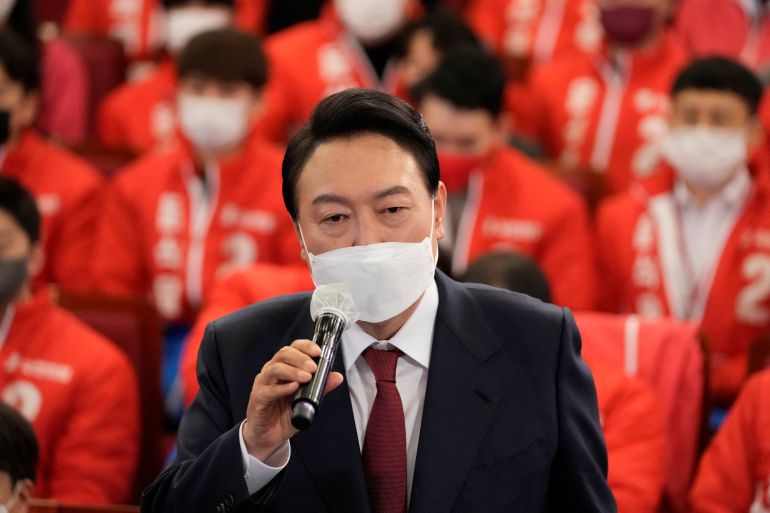Yoon Suk-yeol wins South Korea’s presidential election
Conservative political novice vows national unity after winning the most closely fought election in recent South Korean history.

Yoon Suk Yeol, a conservative former top prosecutor, has been elected South Korea’s new president, defeating his chief liberal rival in one of the country’s most closely fought presidential elections.
With more than 98 percent of the ballots counted, Yoon had 48.6 percent of the votes against his rival Lee Jae-myung’s 47.8 percent.
Keep reading
list of 4 itemsSouth Korea puts CEOs on notice with contentious work safety law
As house prices soar, ordinary South Koreans learn to love stocks
South Korea presidential election: Exit polls show dead heat
Yoon said on Thursday that he would honour the constitution and the parliament and work with opposition parties when he takes office as the country’s next leader, calling the election result a “victory of the great people”.
“Our competition is over for now,” he said in an acceptance speech, thanking and consoling Lee and other rivals.
“We have to join hands and unite into one for the people and the country.”
At a separate ceremony with supporters, Yoon said he would put top priority on “national unity,” adding all people should be treated equally regardless of their regional, political and socioeconomic differences.
“I would pay attention to people’s livelihoods, provide warm welfare services to the needy, and make utmost efforts so that our country serves as a proud, responsible member of the international community and the free world,” he said.
Yoon is to take office in May and serve a single five-year term as leader of the world’s 10th-largest economy.
Earlier, Lee, a former governor of Gyeonggi province, conceded his defeat at his party headquarters.
“I did my best but wasn’t able to live up to expectations,” a glum Lee said. “I congratulate candidate Yoon Suk Yeol. I sincerely ask the president-elect to overcome division and conflicts and open a new era of unity and harmony.”
The election boiled down to a two-way showdown between Yoon from the opposition People Power Party and Lee from the governing Democratic Party. They spent months slamming, mocking and demonising each other in one of the most bitter political campaigns in recent memory, aggravating the country’s already severe domestic divisions.
Critics said neither candidate has presented a clear strategy for how they would ease the threat from North Korea and its nuclear weapons. They also said voters are sceptical about how both would handle international relations amid the US-China rivalry and how they would address widening economic inequality and runaway housing prices.
Yoon has said he would deal with North Korean provocations sternly and seek to boost trilateral security cooperation with Washington and Tokyo. He also said he would make an enhanced alliance with the United States the centre of his foreign policy while taking a more assertive stance on China.
After North Korea’s latest reported ballistic missile launch on Saturday, Yoon accused North Korean leader Kim Jong Un of trying to influence the results of the South Korean election in favour of Lee.
“I would [teach] him some manners and make him come to his senses completely,” Yoon told a rally near Seoul.
Lee, for his part, has called for greater reconciliation with North Korea and a diplomatic pragmatism amid the US-China confrontations.
The election came as South Korea has been grappling with an Omicron-driven COVID-19 surge. On Wednesday, health authorities reported 342,446 new virus cases, a record high. People infected with the coronavirus voted after regular voting ended on Wednesday evening.
South Korea’s Constitution limits a president to a single five-year term, so Lee’s party colleague, President Moon Jae-in, could not seek reelection. Moon came to power in 2017 after conservative President Park Geun-hye was impeached and removed from office over a huge corruption scandal.
With conservatives initially in shambles after Park’s fall, Moon’s approval rating at one point hit 83 percent as he pushed hard to achieve reconciliation with North Korea and delve into alleged corruption by past conservative leaders. He eventually faced a strong backlash as talks on North Korea’s nuclear programme faltered and his anti-corruption drive raised questions of fairness.
Yoon had been Moon’s prosecutor general but resigned and joined the opposition last year following infighting about probes of Moon’s allies. Yoon said those investigations were objective and principled, but Moon’s supporters said he was trying to thwart Moon’s prosecution reforms and elevate his own political standing.
Yoon’s critics have also attacked him for a lack of experience in party politics, foreign policy and other key state affairs. Yoon has responded that he would let experienced officials handle state affairs that require expertise.